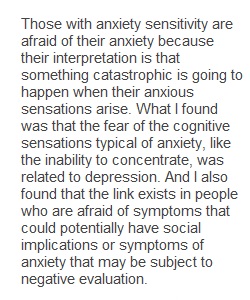


Q Discussion: Anxiety Disorders - Discussion Group 1 From PSYC-01A-52041 99 unread replies.3333 replies. The anxiety disorders have psychological and physical symptoms. The psychological symptoms include worrying, fear of the worst happening, fear of losing control, nervousness, and inability to relax. The physical symptoms reflect arousal of the sympathetic branch of the autonomic nervous system: trembling, sweating, a racing heart, elevated blood pressure (a flushed face), and faintness. These disorders include: Specific Phobic Disorders Social Anxiety Disorder Panic Disorder Generalized Anxiety Disorder Supplemental film: The Anxiety Disorders (Links to an external site.) Read the definition of Anxiety Sensitivity (Links to an external site.) written for Psych Central by Traci Pedersen (2016). In a 250-300 word response, give your thoughts on how this "fear of fear" might develop. What would be the advantage to predicting anxiety sensitivity using the Anxiety Sensitivity Index mentioned by Pederson? Respond to at least two other students in a 75-100 word response. Note: Click the options button in the upper right corner to see the rubric for this exercise.
View Related Questions